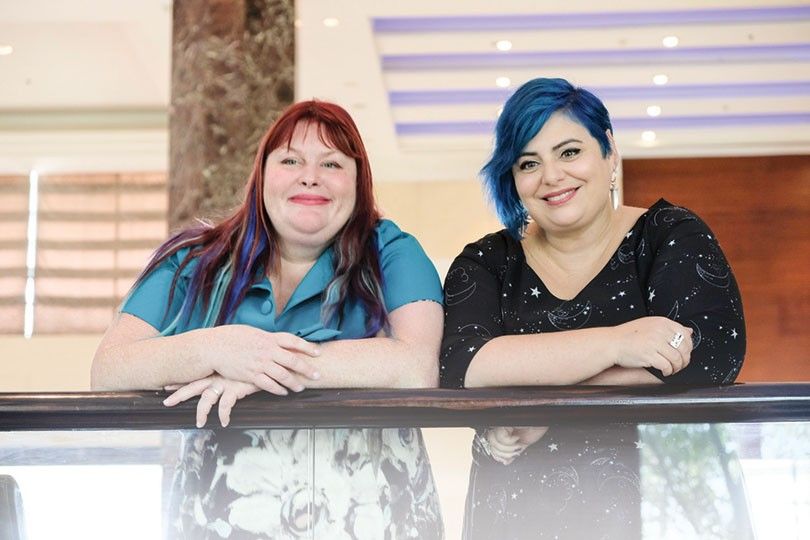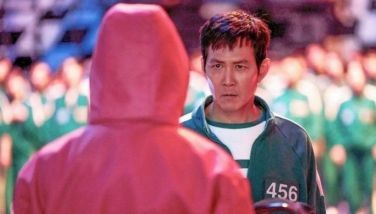Cassandra Clare, Holly Black on how to handle movie adaptation offers

CEBU, Philippines — Book best friends and best-selling authors Cassandra Clare and Holly Black met in 2002, when Clare asked Black for a coffee run following the latter’s book signing for her first tome. They have since written novels together (“The Magisterium” series) and have travelled in book tours alongside each other – making readers cry with their twists and taking them on an adventure of secret worlds and magical creatures.
Clare, author of “The Mortal Instruments” series, and Black, known for “The Spiderwick Chronicles,” were recently in Cebu for their King and Queen Tour with National Bookstore, featuring their latest releases: Clare’s “Queen of Air and Darkness” and Black’s “Wicked King.”
Before meeting with their Cebuano fans at the Northwing Atrium of SM City Cebu, the young-adult fiction writers sat with Cebu press and talked about how they build their winding stories, their interests outside of writing, and what happens in their writing group which they share with authors like Marie Lu, Kelly Link, and Leigh Bardugo among many others. The two also got real about what it’s like to get the movie adaptation treatment, as well as their advice to aspiring writers who want to build a world of their own.
What’s your first hook when it comes to starting a story?
Cassandra: I usually come up with the characters first. I figure out who they are and the story coalesces around the characters. Once I know what the characters are, and what their interactions are with each other, the plot grows with those interactions and relationships that they have with each other.
Holly: I often start with character. But I also start often with a picture that gives me a feeling. It’s an image that I have and I want the story to feel like it. The trick for me, I think, and why I change so much is because I’m chasing the feeling. What is the story that would make me feel that way, or would make the reader feel that way? The questions are very important. When I get to the question then I actually start to have all the building blocks. But it gets me a while to triangulate between this kind of feeling, the characters, and the question of the book.
Can you tell us about your writing group?
Holly: We’re really lucky that we live about five miles from each other. We get together almost every day at Cassie’s house and work on our own stuff. We put our headphones on. It’s great to be in a community like that. It was my dream to be part of a community of writers. It gives you the opportunity to…when you’re stuck, you can ask ‘Hey is this working?’ Especially with professional stuff where you don’t always… You all have your own careers. You can lean on other people’s experience and say ‘Hey I’m having this problem, what do you think?’ It’s lonely in this industry and it’s not lonely because we have that community.
Cassandra: It definitely helps with the writer’s block. If you’re stuck on something, you can turn to your friends. Everybody in the group is very familiar with everybody’s work. We go on these writing retreats every year, very often. It’s a bigger group. It changes on who’s available at the time. They’re able to come in and read each other’s works. You get to read other people’s stuff early. And you get to give advice and they get to give you advice. It’s really helpful.
What do you enjoy outside of writing?
Holly: I obviously spend a lot of time reading. It’s great to be able to read not for work. It’s a real pleasure. And I have a five-year-old. I spend a lot of time, when I’m not working, chasing after him and messing around.
Cassandra: I like to travel. Every time I get any the free time, I like going all over the world, experiencing new things, learning new stuff, visiting places I’ve never been to. It’s great. It’s always really exciting. And ‘True Crime.’ I listen to ‘True Crime’ podcasts and murder mysteries. I’m really addicted to them. Half the time the husband murdered the wife and I’m looking at my husband like, ‘Are you going to push me off the balcony?’
Why do you like to explore themes like fairies and hidden worlds?
Cassandra: The Shadow Hunters is the idea of this secret group of warriors. Growing up, the idea that there was magic in the world that only some people know about, that it was there but some of us didn’t get to see it was really attractive to me. I really wanted to believe that there were werewolves, vampires, fairies, demon hunters. They’re among us! I was willing to accept that I couldn’t see them but I liked the idea that they did exist.
Holly: What I love about fairies is that I love that they are not human. They have never been human. Unlike vampires, werewolves. They are other, they are alien beings that could look like us but are not us. I always come back to the idea of fairy fruit and the idea of something that is so delicious that it turns all other food into ashes in your mouth. Ruinous beauty. The thing you want even though it will destroy you. I guess that’s the story that fascinates me again and again.
With the rich world-building you’ve done for your books, how do you keep your sanity?
Cassandra: We both have field guides. I have lived in the Shadow Hunter world for a long time. Sometimes I have dreams about it. But I’m still pretty good at telling the difference between imagination and what’s actually happening. The most sanity-challenging aspect is keeping everything straight—all of the families, the magic, all of the mythology, the history, the different timelines in the books. So I have an assistant and I also have like a complicated method of keeping things straight. I have a big book, and there are the timelines, backstory, even lists of names that I already used, minor characters who appeared on one page and we never see them again. You have to know all of that when you create a world that feels real. And so relying on that, my own memory, and assistant. And working on projects that aren’t Shadow Hunters keep a balance between Shadow Hunters, reality, other projects…
Holly: I have been writing a lot of different stuff. So it’s a little bit easier to keep it straight. But it’s been fun to do standalones and try out a bunch of different things.
You both had the film adaptation treatment. It’s something many writers and storytellers dream about. What would you like to tell these writers based on your experience?
Holly: I had a good experience with “The Spiderwick Chronicles.” What we were mostly concerned with is we hoped that they would keep true to the spirit of the character so that even if they changed a lot of things it would still feel like the books, feel like the people in the books. And that it would feel like fairies. Secondly, we hoped that they would make a good movie. I’m really happy with it. I think the “Spiderwick” movie, it was a good experience. You definitely have to let go. People are just going to go off and do their thing. You definitely don’t know when it’s going to happen or if it’s going to happen. I spent a lot of time hearing it’s on, it’s off. My agent called and said it’s on, so I went to a local liquor store and said ‘Give me that expensive champagne.’ I uncorked the bottle, poured two glasses, the agents called and said it’s back off. My advice is to only believe it’s really happening if you’re walking around on set.
Cassandra: I had both movie and TV series... I would say for writers, I think the case for me, you’re going to get offers from people to adapt your book into a movie, hopefully. If I could go back, I would tell myself to hold out for a good deal that allows you to be involved in a project because those do exist. And your agent’s going to say ‘You’re never going to be allowed to be involved. Forget the idea that you get to have any input, just sign it.’ And that’s what happened with me. Looking back, I would rather have waited and signed a contract that would have allowed me to have input in the film and TV show. There were aspects I enjoyed. I liked being on set. It was really fun.
Your advice to aspiring writers?
Cassandra: Try to think. It might sound a little corny but you know the idea of writing an original book, etc. What you want to do is think, ‘What can only I bring to the project? What’s my voice? What’s my special? Do I think it’s unique only to me and how do I bring that to what I’m writing so that I’m bringing something different to the world that people connect to?’
Holly: And also to write it for your reader self. Write it for the reader that you are and not think about what everybody says a writer should do. Think about what would I really to read, because you’re the reader you know best. When I was a kid, I wanted to be a writer. I didn’t know anybody who made a living in the arts. And you know how they say, if you believe, you can do it… but it’s hard to believe. I’ve never met a writer, I had no idea. One thing I would say is even if you don’t believe you can do it, you can still do it. Move forward from thing to thing, step to step.
- Latest


























